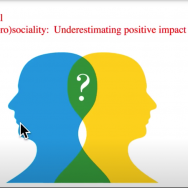Editor’s note: This column is written by Nicholas Epley, the John Templeton Keller Professor of Behavioral Science. It was first published as part of the Chicago Booth Insights series, a partnership with Crain’s Chicago Business, in which Booth faculty offer advice for small businesses and entrepreneurs on the basis of their research.
COVID-19 has radically altered work life. Instead of driving to work, flying to see clients, or talking to colleagues in the halls, we set up Zoom calls, email and text. That increase in text-based interactions, our research suggests, is likely to have unexpectedly negative consequences.
Unless you’re an emoji all-star or write with Jane Austen’s expressiveness, emails and text messages are hotbeds for misunderstanding. Text lacks tone, masking your intentions and emotions. Joking with co-workers is no fun when they think you’re being serious.
Many have turned to videoconferencing to gain needed context. But screen interactions require focused, deliberate and eventually exhausting amounts of attention. Tech glitches create delays, altered speech and endless requests to unmute yourself, turning the otherwise effortless dance of conversation into hard work. This is why “Zoom fatigue” is a term we’ve all learned in 2020.
There’s a better way to stay connected that simply requires reacquainting ourselves with a tried-and-true technology—the telephone. Those smartphones we spend so much time typing into do still allow you to actually talk with another person.
Although visual cues in face-to-face conversations are helpful, our research indicates that a person’s voice—its intonation, pace and volume—is most important for accurately understanding and connecting with others.
Sure, it’s become almost passe to call people these days when an email will suffice. But efficiency and brevity in text comes with costs to our relationships and well-being. Text conveys information but loses accurate insight and our sense of connection to others.
Our research indicates that even people who do not want to talk on the phone have more positive experiences than those who use text-based communication. In one experiment, we asked people to reconnect with someone with whom they had lost touch. We asked if they preferred email or phone and to predict how they would feel using each medium. We then randomly assigned them to do one or the other.
Although our participants expected to feel more connected when they talked, they also expected it would feel more awkward, and so two-thirds said they preferred to connect by email. In reality, people who talked enjoyed their conversations more and felt more connected—without feeling any more awkward—than those who typed, regardless of whether they said they preferred to use the phone or not.
This result is important for our working lives. Working remotely can be a lonely and isolating endeavor. Picking up the phone and talking when possible can make you wiser and increase your well-being.
If you’re worried that younger generations might not buy in to old-fashioned talking, know that the experiment I just described was done with college-age people who proved fully capable of experiencing how nice it was to hear others’ voices.
It is possible that many of us will continue working remotely even after this pandemic is over. If so, then the phone may be one of the only pieces of 20th-century technology that is still well worth using.

